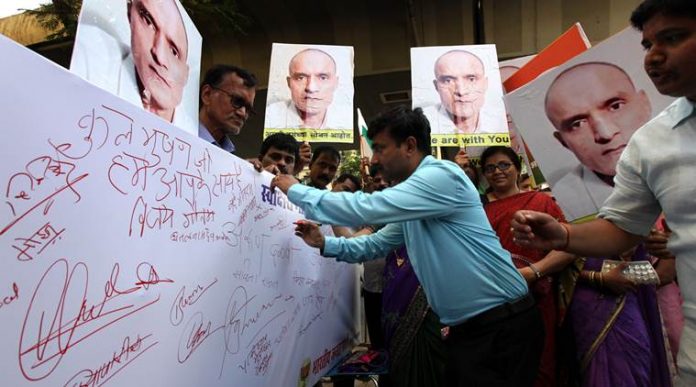15 IMPORTANT AND CONTRAVERSIAL FACTS ON KULBUSHAN JADHAV CASE
- Who is Kulbushan Jadhav?
Kulbhushan Sudhir Jadhav alias (alleged) Hussain Mubarak Patel is an Indian arrested in Baluchistan, Pakistan, over charges of terrorism and spying against Pakistan and for India’s intelligence agency, the Research and Analysis Wing.
- Pakistan’s contention:
According to the Pakistani government, Kulbushan Jadhav is a serving commander in the Indian Navy who was involved in subversive activities inside Pakistan. Pakistan has arrested him on 3rd March 2016 and on 10 April 2017, Pakistani military court have awarded Kulbhushan Jadhav death sentence for alleged espionage and subversive activities.
- India’s contention:
India’s Ministry of External Affairs states that Kulbushan Jadhav has retired from Indian Navy and it has no connection with Kulbushan Jadhav. Accordingly, India charges Pakistan of arresting Kulbushan Jadhav from Iran, where he was carring out his business activites.
- Pakistan and consular access to Kulbushan Jadhav:
Pakistan has denied 16 consular access request to the former naval officer Kulbushan Jadhav. Consular access is the ability of citizens of a country to have access, physical or via communication, with the consular officials of their own country while in a foreign country.
- Treaty between India and Pakistan:
India and Pakistan has signed the Vienna Conventions on Consular Relations of 1963 is an international treaty that establishes and governs consular relations between independent states.
- India files petition:
On May 8, 2017, India moved a petition before the United Nations body (ICJ) to seek justice for Kulbhushan Jadhav. The petition was filed by a senior advocate Harish Salve. India alleges violation of the Vienna Convention on Consular Relations by Pakistan.
- What is ICJ?
The International Court of Justice (ICJ) is the United Nations principal judicial organ, which is holding a public hearing where India and Pakistan are asked to present their case over the contentious Jadhav issue.
- International Court of Justiceorder:
International Court of Justice has on 9 May 2017 ordered temporary suspension of death sentence by Pakistan to Kulbushan Jadhav.
- Pakistan’s opposition to suspension of death sentence:
Pakistan has strongly opposed the ICJ’S ruling and further states that Pakistan does not accept the international court’s jurisdiction when the order relates to issues that involve its national stability and this happens in Jadhav’s case.
- India asks ICJ to declare death sentence illegal:
India has asked the ICJ to declare the death sentence illegal as it is violative of international law and treaty rights. ICJ shall also prevent Pakistan from acting in contravention of the Vienna Convention and international law by giving effect to the death sentence or the conviction in any manner and directing Pakistan to release the convicted Indian National.
- India also denies video confession by Jadhav:
India has denied and considered it the video confession made by Kulbushan Jadhav as fake, where Jadhav confessed his connection with the Indian intelligence agency RAW and a serving officer of Indian Navy.
- ICJ proceedings:
Proceedings in International Court of Justice started in 15th July 2017. A 11 judge bench has been constituted for the same. Former Supreme Court judge B P Jeevan Reddy and Pakistan’s former Attorney General Syed Sharifuddin Pirzada were appointed into the bench as ad-hoc judges.
This is as per ICJ rules, when a bench does not include a judge possessing the nationality of the country party to a case, person of that state shall be appointed to sit as a judge ad-hoc for the purpose of the case.
- Counsel from both sides:
India has sent its legal teams to put forward their arguments; led by Harish Salve. While Pakistan has Khawar Qureshi.
- India’s demands at ICJ:
- immediate suspension of death penalty,
- Declare sentence of military court – violative of Vienna convention,
- Restrains Pakistan to give effect to death penalty and annul the Pak courts order,
- Declare the decision of Pakistan court illegal.
- Atlantique incident:
India and Pakistan faced each other at International Court of Justice about 18 years ago when Islamabad (Pakistan) sought its intervention over naval aircraft, being shot down by India. (Atlantique incident). A 16-judge bench of the court decided in favour of India on June 21, 2000 voted 14-2 to dismiss Pakistan’s claim.





